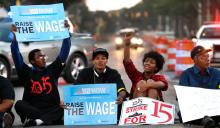
Tumultuous times offer us an opportunity to revisit previous assumptions about the way the world works–and these are definitely tumultuous times. This blog has considered the discomfort most of us feel witnessing elements of our society that weren’t always so obvious: the increasing displays of racial animus, widespread visual evidence that the policeman may not always be our friend, the disregard for others displayed by the “in your face” mask and vaccine refusers… and of course, we’ve had to deal with the pandemic’s upending of so much of what we used to think of as our normal lives.
The economic realities as we emerge from that pandemic are also challenging some unthinking assumptions about wealth and poverty.
Once more, Ezra Klein gets to the crux of the issue.
The American economy runs on poverty, or at least the constant threat of it. Americans like their goods cheap and their services plentiful and the two of them, together, require a sprawling labor force willing to work tough jobs at crummy wages. On the right, the barest glimmer of worker power is treated as a policy emergency, and the whip of poverty, not the lure of higher wages, is the appropriate response.
Reports that low-wage employers were having trouble filling open jobs sent Republican policymakers into a tizzy and led at least 25 Republican governors — and one Democratic governor — to announce plans to cut off expanded unemployment benefits early. Chipotle said that it would increase prices by about 4 percent to cover the cost of higher wages, prompting the National Republican Congressional Committee to issue a blistering response: “Democrats’ socialist stimulus bill caused a labor shortage, and now burrito lovers everywhere are footing the bill.” The Trumpist outlet The Federalist complained, “Restaurants have had to bribe current and prospective workers with fatter paychecks to lure them off their backsides and back to work.”
Klein considers recent proposals to eliminate poverty via a “negative income tax”–very similar to the one proposed several years ago by none other than Milton Friedman. Unlike a guaranteed annual income, this subsidy would phase out as incomes rose, so it would be less costly than a universal benefit. But as Klein observes, the problem isn’t really the cost.
The real political problem for a guaranteed income isn’t the costs, but the benefits. A policy like this would give workers the power to make real choices. They could say no to a job they didn’t want, or quit one that exploited them. They could, and would, demand better wages, or take time off to attend school or simply to rest. When we spoke, Hamilton tried to sell it to me as a truer form of capitalism. “People can’t reap the returns of their effort without some baseline level of resources,” he said. “If you lack basic necessities with regards to economic well-being, you have no agency. You’re dictated to by others or live in a miserable state.”
But those in the economy with the power to do the dictating profit from the desperation of low-wage workers. One man’s misery is another man’s quick and affordable at-home lunch delivery.
Klein reminds readers that America is full of hardworking people who are kept poor by very low wages and harsh circumstance–people who want a job but can’t find one, or who can only find jobs that are “cruel in ways that would appall anyone sitting comfortably behind a desk.”
We know the absence of child care and affordable housing and decent public transit makes work, to say nothing of advancement, impossible for many. We know people lose jobs they value because of mental illness or physical disability or other factors beyond their control. We are not so naïve as to believe near-poverty and joblessness to be a comfortable condition or an attractive choice.
Klein also reminds us that “following the money” tells us what our priorities really are–that we always find money to pay for the things we value.
What America spends its national wealth on doesn’t reflect well on those values. We’ve spent trillions of dollars on wars in the Middle East and on tax cuts for the wealthy, and billions subsidizing fossil fuel companies and factory farms.
As Klein says, it’s within our power to wipe out poverty. It simply isn’t among our priorities.
By Sheila Kennedy
